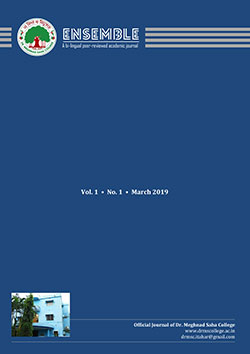APPLICATION OF REMOTE SENSING & GIS FOR CHANNEL SHIFTING: A CASE STUDY OF ATREYEE RIVER, DAKSHIN DINAJPUR DISTRICT, WEST BENGAL, INDIA
Abstract:
River channel shifting becomes an endemic and recurrent natural hazard. It acts as the relentless transformation of landforms by the two processes like erosion and accretion on river bank areas, especially in alluvial floodplain worldwide. Lateral channel shifting is becoming one of the significant characteristics of the alluvial lower course rivers, and it threatens the channel instability also. One of the advance scientific technologies, Remote Sensing & GIS can be applied to identify such spatio-temporal changes of river channel shifting as well as in the monitoring of changing in land use and land cover in the riverine areas. The present work examines the temporal variation of the lateral channel shifting by adopting the Remote Sensing and GIS techniques, and it explores the quantitative assessment to detect the changes in the areal extent due to channel accretion and erosion in the study area. The present work is based on the datasets combined with field survey and Landsat satellite data of two different years (1973 & 2018). The systematic study of this present work is helpful to evaluate the lateral shift and changes in channel platform of the selected area between Kamdebpur and Fatepur, part of Atreyee River basin areas in Dakshin Dinajpur district, West Bengal. Thus, present work is very significant for focusing the nature of shifting of this lifeline channel Atreyee for the last few decades and providing the knowledge about meandering as well as its impacts on the areal coverage of landscape caused by natural as well as man-made factors.
Keywords: transformation of landforms, channel instability, spatio-temporal analysis, lateral shift, channel migration, channel platform
https://doi.org/10.37948/ensemble-2020-0201-a007
Views: 9902



